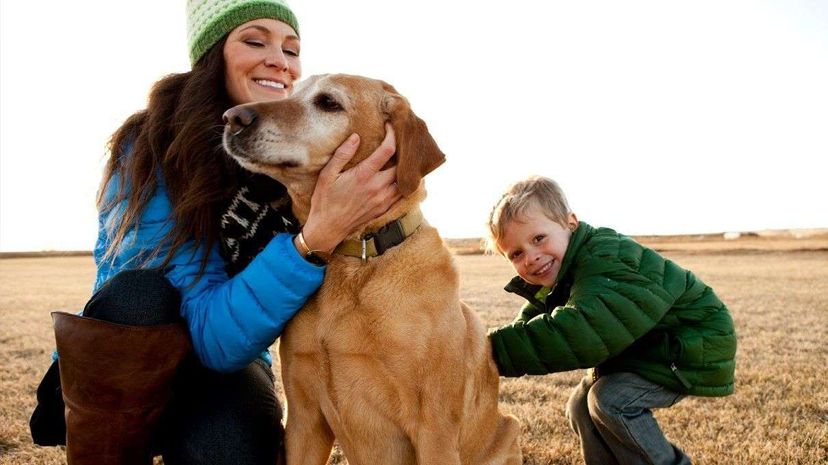 “Ever hear a mom insist to her kids, "I love all of you the same?" It turns out there are some similarities when it comes to the neurological underpinnings of mom-child and mom-dog bonds. But there are also some differences, and neither kid nor dog really has the edge. Jordan Siemens/Getty Images
“Ever hear a mom insist to her kids, "I love all of you the same?" It turns out there are some similarities when it comes to the neurological underpinnings of mom-child and mom-dog bonds. But there are also some differences, and neither kid nor dog really has the edge. Jordan Siemens/Getty Images
Scientists are, probably at this very moment, busy studying how dogs think, measuring their brain activity at an Emory University laboratory in Atlanta to see (among other tests) whether dogs prefer us, their masters, or that bowl of chow over there.
It’s probably only fair, of course, because researchers already have done it the other way around. They’ve used brain scans on humans — on moms, specifically — to measure how they react when faced with a similar choice: their kid or their dog.
The mom study was done back in 2014, when a Boston-based team that included a psychiatrist and a veterinarian decided to look at which neural substrates, or parts of the brain associated with particular behaviors or psychological states, were activated when moms looked at pictures of their kids and pictures of their dogs.
After all, researchers noted, people are pretty attached to their family and friends. Would that bond look similar, neurologically, for their pet family members?
Here’s what Lori Palley of the [Massachusetts General Hospital] Center for Comparative Medicine, co-lead author of the report and a doctor of veterinary medicine, told the Harvard Gazette: "Several previous studies have found that levels of neurohormones like oxytocin — which is involved in pair-bonding and maternal attachment — rise after interaction with pets, and new brain-imaging technologies are helping us begin to understand the neurobiological basis of the relationship, which is exciting."
The researchers employed brain scans (functional magnetic resonance imaging, or fMRI machines) on 18 willing moms, 14 of whom had good quality fMRI data and were included in the study’s results. They measured brain activation patterns as moms looked at pictures of their kids and dogs. They also showed the moms pictures of other people’s kids, too, and strange dogs.
When they studied the brain patterns, they found many overlapping areas of the brain that were activated by pictures of both the mom’s own child (in this study, they were all between 2 and 10 years old) and the family dog (which had to have been part of the family for at least two years). These areas are in regions of the brain "involved in reward, emotion, and affiliation," according to the study.
Other areas of the brain (involved in reward and affiliation) were activated by images of the child but not the dog. And one area (known as the fusiform gyrus, involved in visual and face processing and social cognition) was activated more by the pet than by the child.
Here’s how the authors explain that difference: "Facial cues may be a more central communication device for dog-human interaction. Face perception may contribute to the human-dog bond by helping owners identify their dog, use gaze direction to communicate, and interpret emotional states."
So what do we make of all this? Here’s the authors again: "These results demonstrate that the mother-child and mother-dog bond share aspects of emotional experience and patterns of brain function, but there are also brain-behavior differences that may reflect the distinct evolutionary underpinning of these relationships."
In effect, moms don’t play favorites when it comes to their babies. Each one is special.
NOW THAT’S INTERESTING
At Emory’s Canine Cognitive Neuroscience Laboratory, one of the earliest findings was that a part of a dog’s brain, like our own, reacts to things it enjoys, like food or the sight of an owner. "Dogs, and probably many other animals (especially our closest primate relatives), seem to have emotions just like us," Emory’s Gregory Berns wrote in The New York Times. “And this means we must reconsider their treatment as property." Berns is the author of the best-seller "How Dogs Love Us: A Neuroscientist and His Adopted Dog Decode the Canine Brain."


